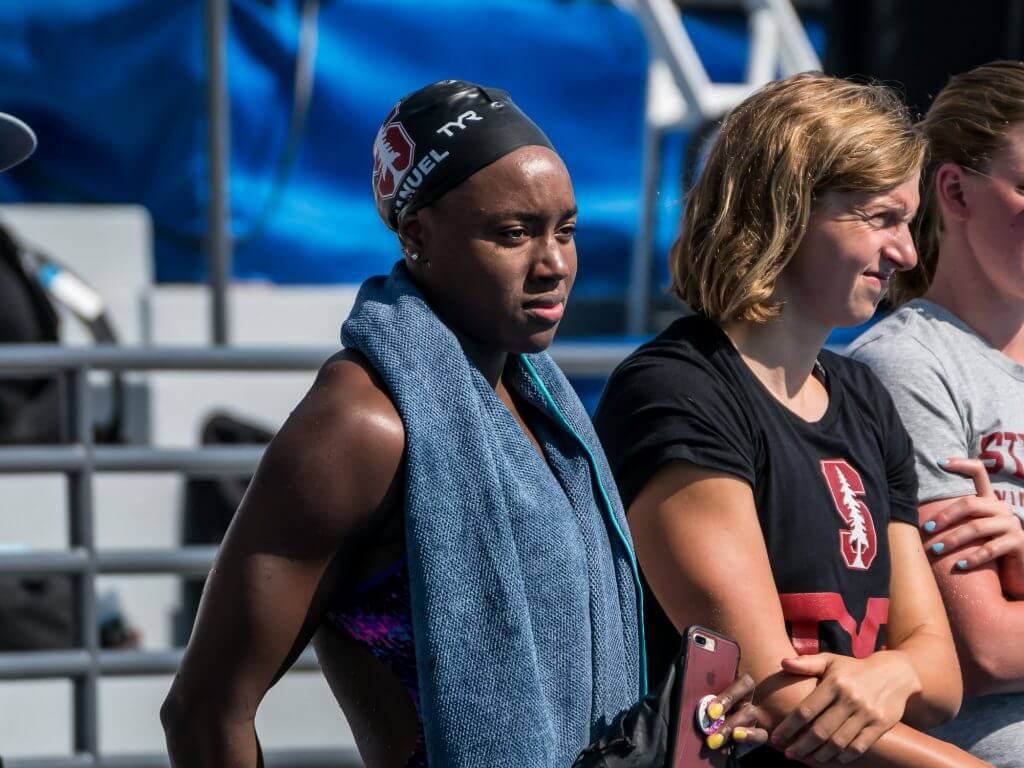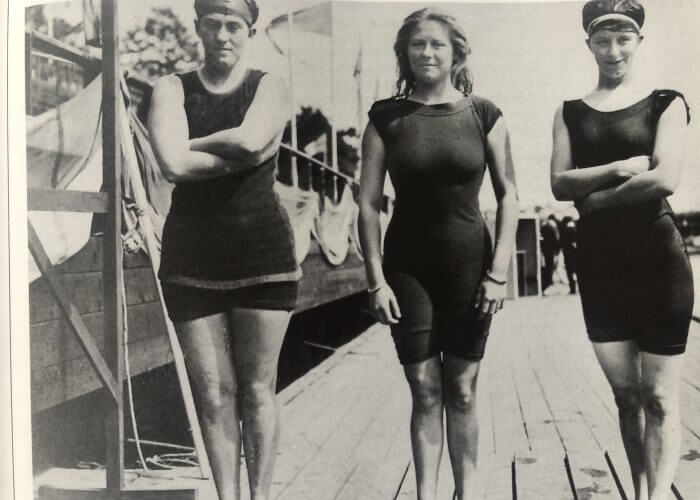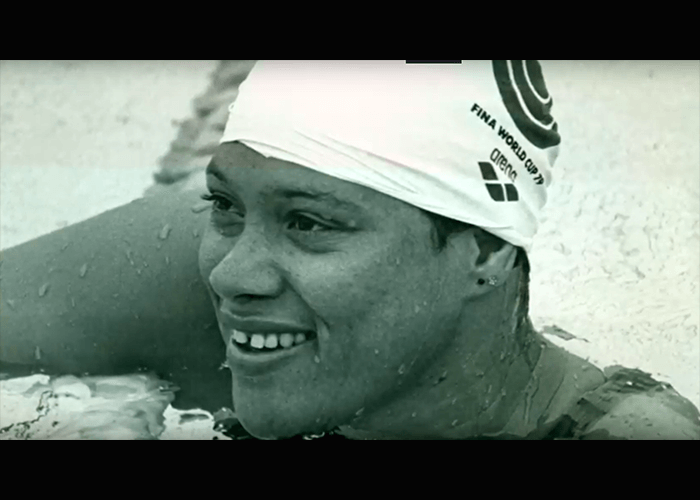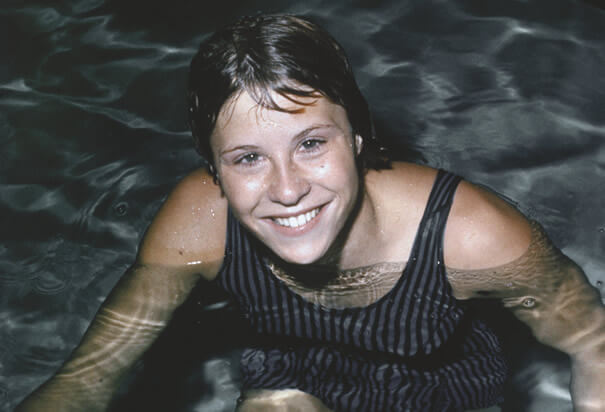Barrier Breakers: Women Who Have Elevated the Sport

Barrier Breakers: Women Who Have Elevated the Sport
By Gigi Picard Swimming World College Intern
It is easy to look back on the year 2020 in sports and feel a measure of disappointment: seasons were cut short, championships were canceled, stands stood empty, athletes were quarantined. It all felt a bit dismal, at best. Yet, amazingly, there were some very inspiring moments for women in sports throughout the year.
On a college level, Vanderbilt’s Sarah Fuller was the first woman to score in a Power Five football game. The San Francisco 49ers Katie Sowers became the first woman to coach in a Super Bowl. The Miami Marlins hired the first woman General Manager in all of men’s professional sports. And in late December, the Spurs’ Becky Hammon became the first woman to be head coach for an NBA regular season game.
Of course, female swimmers missed a big opportunity to break through when the Olympics were postponed. The world did not get a chance to see top female swimmers compete in the 1500-meter freestyle for the first time. My initial disappointment made me stop and think: What other female barriers-breaking swimmers have paved the way for this inevitable Olympic breakthrough?
Here are a few we all need to know:
Women Competitors at the 1912 Summer Olympics

The first Olympic swimming podium for women – l-r, the pioneer champion Fanny Durack, Australia teammate Mina Wylie and Britain’s Jennie Fletcher – Photo Courtesy: ISHOF
These Games, held in Stockholm, Sweden, featured the first women’s swimming and women’s diving events in Olympic history. Fanny Durack, representing Australasia, swam the 100-meter freestyle and became the first-ever women’s Olympic swimming gold medalist and Australia’s first woman Olympic medalist. Interestingly, the United States did not allow women to compete in swimming until 1920. In that Olympic year, Ethelda Bleibtrey touched the wall first in the 100-meter freestyle, to become the first American woman to win an Olympic gold medal in swimming.
Gertrude Ederle
Ederle was an American Olympic swimmer who, on her second attempt, became the first woman to swim across the English Channel in 1926. Her time beat the men’s existing record by approximately two hours. Ederle was known as the “Queen of the Waves,” because she held 29 national and world swimming records. In 1965, she was inducted into the International Swimming Hall of Fame. Notably, Ederle eventually lost her hearing, but always the achiever, she went on to teach deaf children how to swim.
Enith Brigitha

Photo Courtesy: Enith Brigitha/ISHOF
Representing the Netherlands in the 1976 Olympic Games, Brigitha became the first black woman to win an Olympic medal, earning bronze in both the 100-meter and 200-meter freestyle. The two women who beat her were found to have been doping. Brigitha had previously qualified for the 1972 Munich Games as well. She started swimming in the Caribbean Sea and was considered the best Dutch swimmer of her era. Brigitha was named “Dutch Sportswoman of the Year” in 1973 and 1974.
Simone Manuel
In 2016, Manuel tied for the gold medal in the 100-meter freestyle with an Olympic record time of 52.70, making her the first African-American woman to win an individual Olympic medal and the first black woman to win a gold medal. In 2019, she helped teach children how to swim through a summer swim camp at LeBron James’ I Promise School in Akron, Ohio. A champion in and out of the pool, she has spoken out for racial justice, adding her voice to calls for change after the murders of George Floyd and Breonna Taylor. Over the past several months, Manuel has given back to her community in Sugar Land, Texas during the pandemic by partnering with Hunger Not Impossible to deliver meals and advocating for racial justice.
Donna de Varona

Donna de Varona Photo Courtesy: Swimming World Archive
In 1960, at age 13, de Varona qualified for the U.S. Olympic swim team. By 1964, she had broken 18 world records and won two Olympic gold medals in the pool. The following year, she switched careers to become the first and youngest female sportscaster. She became the first woman to cover the Olympics and the first President of the Women’s Sports Foundation. But, more importantly, she became a “moving force” behind the passage of the 1978 Amateur Sports Act and Title IX. For those of you who may be unfamiliar, Title IX is legislation passed in 1972 that prohibits sex discrimination in education activities or programs receiving federal funding. Title IX allows athletes like me to compete in collegiate sports and is the legal foundation for efforts to keep women’s swim programs alive.
Katie Ledecky
For decades, female distance swimmers pushed hard to break the stereotype that women are somehow too weak or delicate to compete in distance events. Over the past few years, Katie Ledecky has smashed stereotypes. A world record holder in multiple events, she was projected to dominate the 1500-meter free in Tokyo. Watching Ledecky crash the pool has led many fans to claim that Ledecky swims like a man. Earlier this year, swim commentator Rowdy Gaines corrected those people by saying: “She doesn’t swim like a man, she swims like Katie Ledecky!” That says it all.
We hope to see history made in the 2020 Games with Ledecky and her field of competitors in the 1500 free. Until then, I think we can all draw inspiration from the women who have fearlessly led the way for all of us.
All commentaries are the opinion of the author and do not necessarily reflect the views of Swimming World Magazine nor its staff.





Great Article!